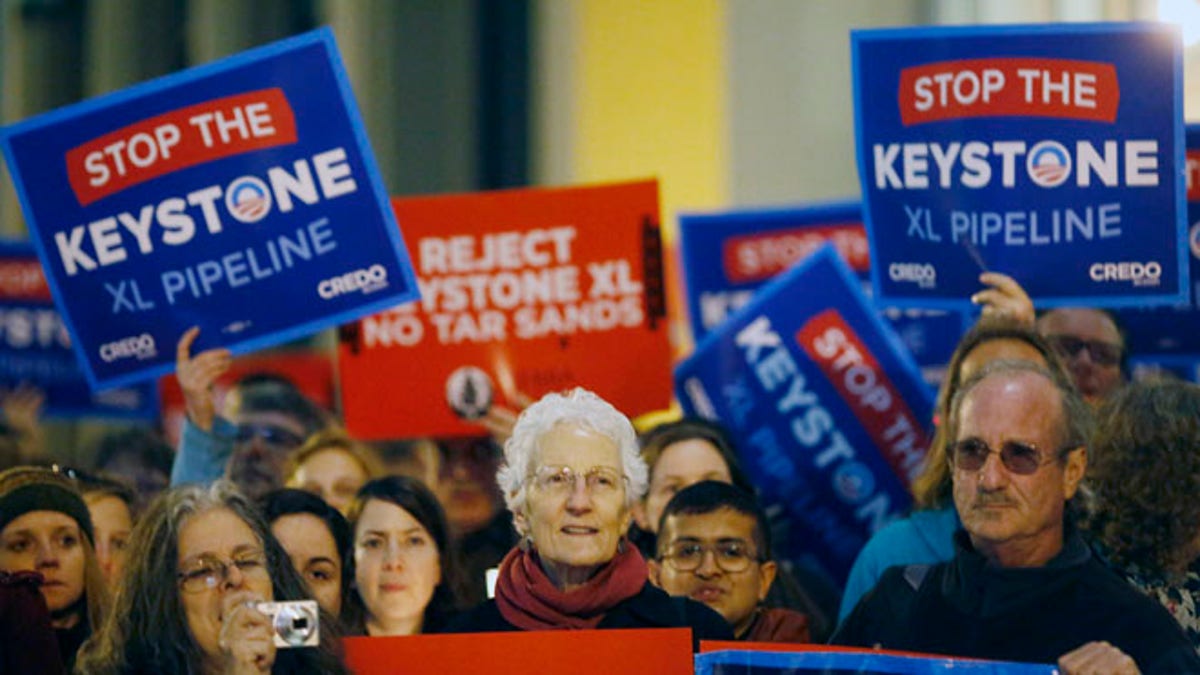
Feb 3, 2014: Demonstrators protest against the proposed Keystone XL oil pipeline in San Francisco, California. (Reuters)
The national debate on the controversial Keystone XL pipeline will concentrate on Lincoln, Neb., Friday as that state’s Supreme Court hears arguments in a case examining whether lawmakers short-circuited the regular approval process in an attempt to expedite the pipeline’s construction.
The court’s ruling – not expected for several months -- could force President Obama’s hand in making a final decision whether to green light the oft-stalled project.
Protests and political outrage have accompanied the proposed pipeline for years, but quieted down in recent months because of the Nebraska litigation and the Obama administration’s decision to wait for a ruling in the case before moving forward.
“The issue never goes away if you’re dealing with the pipeline on a local level,” anti-pipeline activist Jane Kleeb told Fox News. “While it may not be on the front page of newspapers nationwide, we’re dealing with it on a daily basis.”
Friday’s case before the seven-member court does not examine whether the pipeline should be built in Nebraska – or anywhere else -- but rather if the state’s unicameral legislature improperly passed a law giving the governor authority to approve the project rather than the state’s Public Service Commission. It will take a supermajority of five justices to invalidate the law.
Earlier this year, a lower state court judge ruled the lawmakers’ actions violated Nebraska’s constitution. The Obama administration took the ruling as a sign that the Nebraska portion of the pipeline’s routing could be in jeopardy and effectively put its review process on hold.
Because the proposed pipeline originates in Canada and crosses over the border, the State Department must review the plan. In addition, Obama would have to sign off on the project before it can move forward.
Environmentalists have attacked the plan as a land grab for private interests that endangers underground water resources and further encourages oil drilling in the tar sands region of Alberta. “Why should we allow Canada to continue to mine this kind of fossil fuel which we know is only going to harm the climate?” Kleeb told Fox.
But the project has the support of labor unions that are counting on thousands of construction jobs and others, including most Republicans, who see the pipeline as a necessary piece of energy security.
“This pipeline has been so over studied and over analyzed and we’ve looked over every single square inch of dirt that it’s going to cross over,” Nebraska Attorney General Jon Bruning told Fox News. “I think it’s time to build it,” he added.
The planned 1,179-mile pipeline would start in central Alberta and move south across the heartland of America into Nebraska, where it would meet up with preexisting 36-inch pipes.
In recent weeks, legal briefs were submitted to the court detailing arguments over the 2012 legislation called LB 1161. State officials defend the law that gave Governor Dave Heineman, a Republican, the authority to approve the Nebraska portion of the pipeline after a review by state environmental regulators.
The key factor in the case may be whether the pipeline is considered a “common carrier” under Nebraska law. Common carriers are “for hire” entities that are available to the public to transport goods or people. In Nebraska, the state’s Public Service Commission solely regulates common carriers.
The state argues that a pipeline can be considered a common carrier; in this instance it isn’t because the Keystone XL Pipeline merely travels through the state rather than servicing businesses or residents solely inside Nebraska.
“I think that it’s clear that in this state, common carriers are defined as intrastate – just within the borders of our state,” Bruning explained. “This pipeline, because it runs through other states including ours, it’s an interstate carrier.”
David Domina, the lawyer for the landowners, said, “LB 1161 contains telltale admissions that it does apply to common carriers.” He notes that TransCanada, the company building the pipeline, isn’t an oil company but rather is “for hire” to companies that drill. “This is quintessential common carriage,” he writes.
There are other more technical issues in the case covering whether the landowners have the legal grounds to challenge the law, whether eminent domain land grabs impact the common carrier distinction and if a $2 million appropriation to facilitate the pipeline’s construction also violates state constitution.
But it’s the question over whether the legislature usurped the power of the Public Service Commission that’s expected to draw the most attention. If the court upholds the prior decision, TransCanada would then have to file paperwork with PSC for approval -- a process that could go well into 2015.
However, if the court determines that LB 1161 is good law, then all eyes will return to Washington to see what Obama decides.
Former Democratic Governor Ben Nelson appointed five members of the court but one, John Wright, has recused himself from the case and been replaced by a lower court judge appointed by Heineman. The current governor also appointed Chief Justice Michael Heavican but Bruning said he would be surprised if politics factor into the final decision.
“We have a great Supreme Court, “Bruning said. “We trust them. They’re nonpartisan in their decision-making. I think they’re going to make the right decision for the state of Nebraska.”
Fox News’ John Roberts also contributed to this story












































